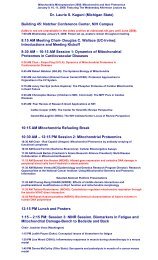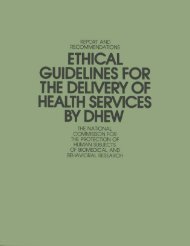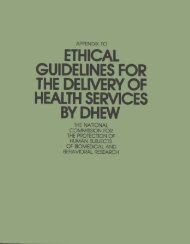RESEARCH ON THE FETUS - National Institutes of Health
RESEARCH ON THE FETUS - National Institutes of Health
RESEARCH ON THE FETUS - National Institutes of Health
You also want an ePaper? Increase the reach of your titles
YUMPU automatically turns print PDFs into web optimized ePapers that Google loves.
is deserving <strong>of</strong> care and respect. Although the Commission has not addressed<br />
directly the issues <strong>of</strong> the personhood and the civil status <strong>of</strong> the fetus, the<br />
members <strong>of</strong> the Commission are convinced that moral concern should extend to all<br />
who share human genetic heritage, and that the fetus, regardless <strong>of</strong> life prospects,<br />
should be treated respectfully and with dignity.<br />
The members <strong>of</strong> the Commission are also convinced that medical research has<br />
resulted in significant improvements in the care <strong>of</strong> the unborn threatened by<br />
death or disease, and they recognize that further progress is anticipated. Within<br />
the broad category <strong>of</strong> medical research, however, public concern has been expressed<br />
with regard to the nature and necessity <strong>of</strong> research on the human fetus. The evidence<br />
presented to the Commission was based upon a comprehensive search <strong>of</strong> the<br />
world's literature and a review <strong>of</strong> more than 3000 communications in scientific<br />
periodicals. The preponderance <strong>of</strong> all research involved experimental procedures<br />
designed to benefit directly a fetus threatened by premature delivery, disease or<br />
death, or to elucidate normal processes or development. Some research constituted<br />
an element in the health care <strong>of</strong> pregnant women. Other research involved only<br />
observation or the use <strong>of</strong> noninvasive procedures bearing little or no risk. A<br />
final class <strong>of</strong> investigation (falling outside the present mandate <strong>of</strong> the Commission)<br />
has made use <strong>of</strong> tissues <strong>of</strong> the dead fetus, in accordance with accepted standards<br />
for treatment <strong>of</strong> the human cadaver. The Commission finds that, to the best <strong>of</strong><br />
its knowledge, these types <strong>of</strong> research have not contravened accepted ethical<br />
standards.<br />
Nonetheless, the Commission notes that there have been instances <strong>of</strong> abuse<br />
in the area <strong>of</strong> fetal research. Moreover, differences <strong>of</strong> opinion exist as to<br />
whether desired results could have been attained without the use <strong>of</strong> the human<br />
fetus in nontherapeutic research.<br />
Concern has also been expressed that the poor and minority groups may bear<br />
an inequitable burden as research subjects. The Commission believes that those<br />
groups which are most vulnerable to inequitable treatment should receive special<br />
protection.<br />
The Commission concludes that some information which is in the public<br />
interest and which provides significant advances in health care can be attained<br />
only through the use <strong>of</strong> the human fetus as a research subject. The Recommendations<br />
62











